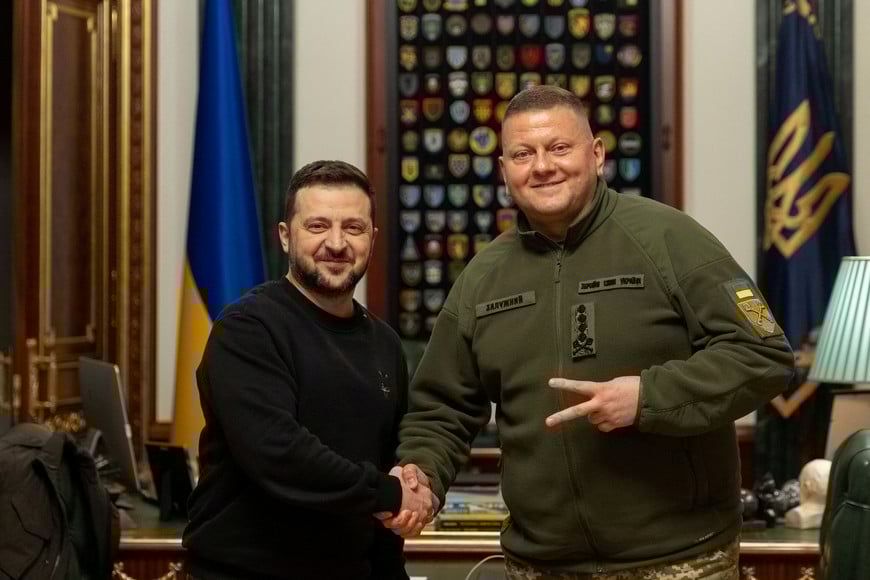Ukraine received good news in the last week after the approval of the military aid package valued at $60.8 billion by the United States House of Representatives.
It is part of a project that has a total of 95 billion dollars, which includes Taiwan and Israel, and that already has the signature of President Joe Biden, putting an end to one of the main novels against Trumpist senators.
Volodimir Zelensky’s army will be able to resupply itself mainly with ammunition, the field where it suffers the main shortcomings in the fight against the Russian invasion. However, the crisis is increasing in a figure that is more complex to manipulate: military personnel.
In a space where Russia should not have complications, the Ukrainians have suffered sensitively (beyond human logic) the numerous casualties and the extension of the conflict over time.
More than two years after the start of the attack from the Kremlin, some 6.5 million Ukrainians have been registered as refugees in different countries in Europe and 3.7 million have been internally displaced, according to data from UNHCR (UN Agency for Refugees).
One of the countries that hosted the most is Poland, with more than 950 thousand refugees, according to Statista data. Another, located among the last in the ranking, but with important geopolitical relevance, is Lithuania with 41 thousand people, based on the local Migration Department.
Both countries have recently expressed their support for collaborating with the recent mobilization law approved in kyiv, allowing the return of Ukrainians who are subject to military service.
Ukrainian conscription law
On April 11, the new Ukrainian military mobilization law was approved in the Verkhovna Rada (unicameral parliament) with 283 votes in favor, one against and 49 abstentions.
In this way, kyiv could mobilize some 500,000 new soldiers that the central government claims to need. Valerii Zaluzhnyi, head of the armed forces, refuted the request and within weeks, in early February, he was dismissed.
 Volodymyr Zelenskiy, president of Ukraine, with Valerii Zaluzhnyi. Credit: Ukrainian Presidential Press Service
Volodymyr Zelenskiy, president of Ukraine, with Valerii Zaluzhnyi. Credit: Ukrainian Presidential Press Service The law modified the recruitment age from 27 to 25 years, includes a three-month basic training for the range between 18 and 25 years old, and adds the possibility of mobilizing personnel with minor disabilities. Those listed include blindness in one eye, amputation of a hand or fingers, stump of the thigh or lower leg with shortening of the leg by 7 centimeters or more, or castration.
They could also include criminals and prisoners for minor crimes, an aspect that was criticized in Moscow at the time for the role of the Wagner Group of the deceased Yevgeny Prigozhin in dubious conditions.
Adding to the legislation is the most recent announcement by Foreign Minister Dmitry Kuleba, which further limits consular services abroad for Ukrainian men subject to military service. “The stay abroad does not exempt the citizen from his duties towards the Homeland,” argued the president.
On the Polish side, its Minister of Defense, NAME, expressed himself along the same lines: “I think that many of our compatriots were horrified and continue to be horrified when they see young Ukrainians in cafes and hear about the effort it costs us to help Ukraine”.
“It is still difficult to say what measures to take, we will have to discuss it. Of course no one is going to arrest them and send them to Ukraine, this is not going to happen,” declared more austerely Laurynas Kasciunas, Lithuanian Defense Minister, who in turn raised the possibility of limiting access to social benefits or documentation by Ukrainian citizens.
Poland and nuclear weapons
Within the framework of its brutal growth in military budget spending (the second largest in Europe with 2.4% of its GDP) and the pairing with France in the concept of “wartime”, Poland went one step further and proposed harbor nuclear weapons.
 See alsoEmmanuel Macron: “Europe can die”
See alsoEmmanuel Macron: “Europe can die” Andrzej Duda, Polish president, offered his territory to host US weapons within the framework of the Nuclear Sharing program, which allows NATO members to carry out such action.
Poland does not share borders with the main territory of the Russian Federation, but it does share borders with the Kaliningrad Oblast, an enclave since 1945 that would be decisive in the event of a regional escalation.
Kaliningrad has an area of 15,125 km², similar to that of countries such as Slovenia or Montenegro.
Warsaw’s other problem is Belarus, Vladimir Putin’s main regional ally and where the Russians have deployed nuclear weapons. Russian Foreign Affairs warned that if they “copy” the measure, Poland will become a target.
Lithuania (with 2.5% of its GDP allocated to the military budget) joins the fray for similar reasons: it shares borders with Kaliningrad, Belarus and is located 108 kilometers from Russia.









